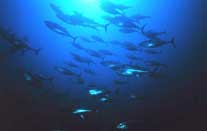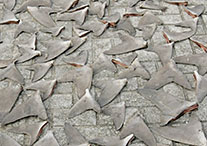From Billions to None SPECIES THREATENED |
VIEW Our Film's Wall of Gratitude, listING those who have Made contributions |
Debates raging over fishing regulations and habitat preservation are eerily similar to those over passenger pigeon exploitation over a century ago. Many scientists are convinced that we are already in the early to mid-stages of the earth’s sixth mass extinction. Climate change, habitat loss, direct take and introduced species lead the way as factors contributing to this growing crisis. A recent British study revealed that birds are the best group to track current extinction rates, and those rates may be ten times faster than records suggest. Current Human Impact on Marine Life Focusing on aquatic systems, a team of scientists led by Dr. Boris Worm of Dalhousie University in Nova Scotia, recently warned that if current trends of over fishing and pollution continue, we face a worldwide seafood collapse by 2048. In the film, we meet Dr. Worm, whose work is aimed at better understanding human impacts on ocean life and assessing alternative approaches to protecting ocean habitat and marine species. Worm’s lab’s analysis of worldwide fishing data reveals that sharks are seriously endangered due to becoming “bycatch,” and for being fished for their fins and for seafood. One third of shark species is endangered; over 11,000 sharks are caught and killed every hour, mostly for their fins, to make shark fin soup. Success Stories The wild turkey, trumpeter swan and sandhill crane were all on their way to oblivion in North America when Martha expired at the Cincinnati Zoo in 1914. As the result of passenger pigeon’s extinction, Congress passed major legislation such as the Migratory Bird Treaty and the Lacey Act. The turkey, swan and crane are all thriving because of it, as well as devoted conservation measures over the decades. The sandhill crane population was seriously depleted due to hunting in the late 19th and early 20th centuries, but now it is the world’s most abundant crane species. Whales are making a comeback as well. Once hunted indiscriminately around the world, many whale species are in much better shape, due to a moratorium on commercial whaling set in 1986 by nations within the International Whaling Commission, Japan included. Japan still attempts “scientific whaling,” but the threats to whale species are much reduced. Endangered Species Act – Now Endangered In 1973, conservation efforts culminated in the passage of the landmark Endangered Species Act, a statement by our people and government that we will not allow species to go extinct through ignorance and neglect. The ESA is currently under attack by those who would rather delete it than recalibrate it during trying times, such as the drought in California. Find out what’s going on in your area regarding conservation issues and challenges. The ESA is too important to lose due to short-term economic interests. That’s what happened to the passenger pigeon. |
| SHARE— | |||||
| HOME | ABOUT THIS FILM | SPECIES THREATENED | SPECIES REVIVED? | MAKE A DIFFERENCE | THE FILMMAKING TEAM | BUY THE DVD | ON PUBLIC TELEVISION | PROJECT PASSENGER PIGEON | SITE COMMENTS | | |||||
 With prices for a single tuna topping $390,000, there is little incentive for fisherman to stop catching them until they’re gone. |
|
|
 Scientists and volunteers at the International Crane Foundation have helped bring back Sandhill cranes from depletion to abundance. |

